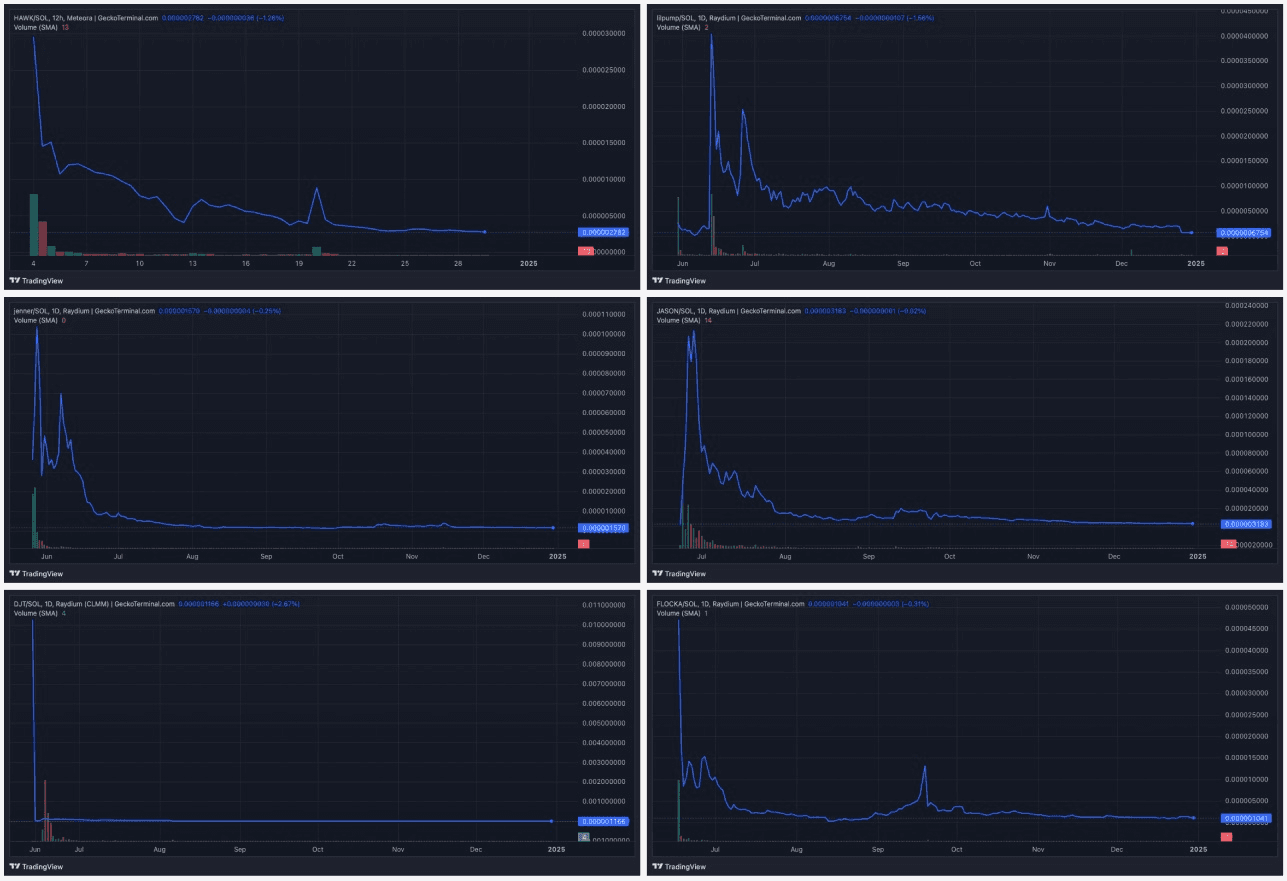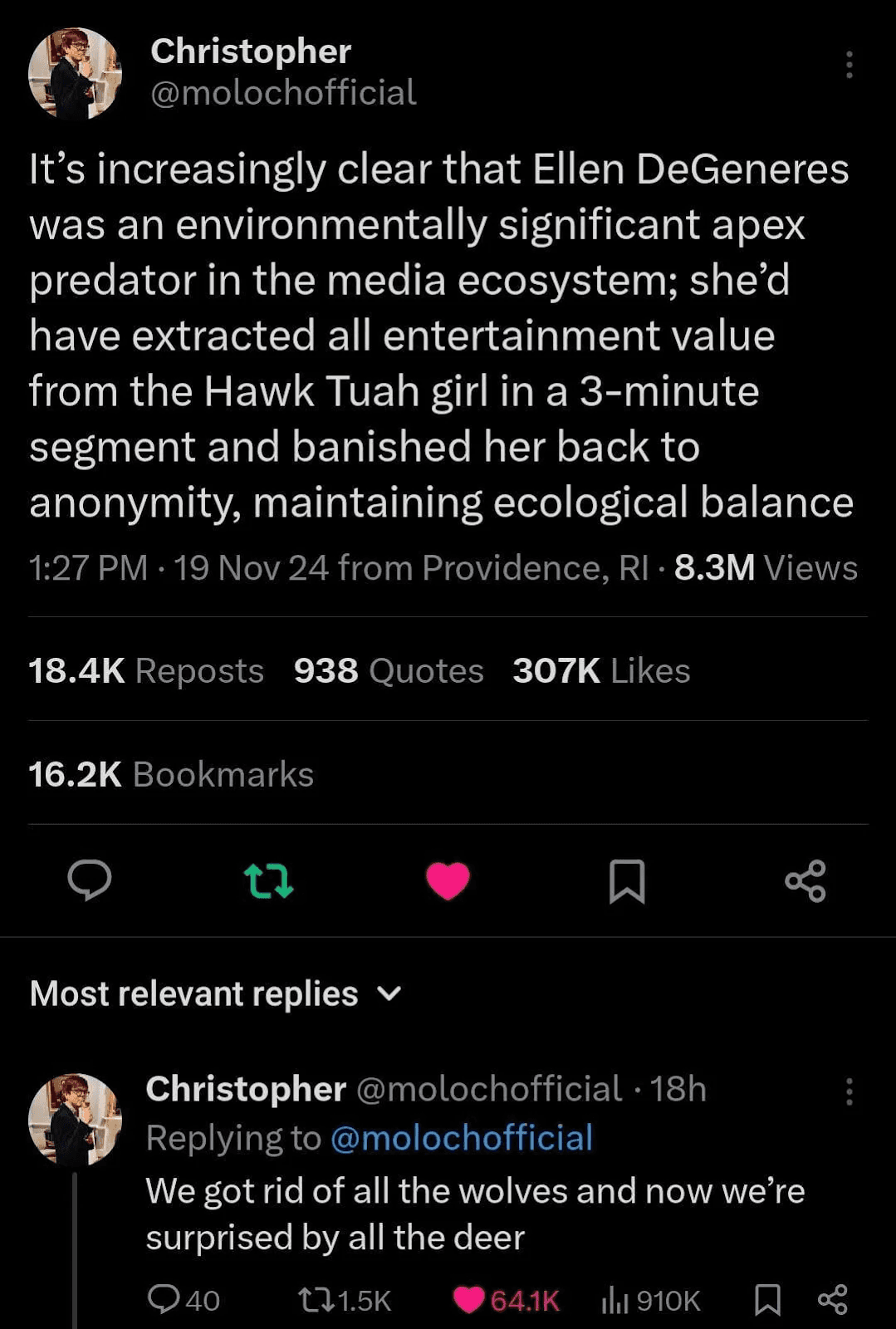One Kind of American Dream: The Year in Hawk Tuah and Crypto Memecoin
Haliey Welch helped define the year in culture, for better or worse. But it remains to be seen what the future holds for her—and celebrity cryptocurrency ventures in general—now that she’s embroiled in a memecoin scandal.On December 3, the day before Haliey Welch fell silent on social media for the better part of a month, the 20-something-year-old woman colloquially known as the Hawk Tuah Girl released the 13th installment of her podcast, Talk Tuah With Haliey Welch. The title of the episode was “HOW TO AVOID GETTING CANCELLED,” and the guest was Brooke Schofield, a 28-year-old cohost of the podcast Cancelled, who earned internet notoriety earlier this year both for trying to get an ex of hers canceled and also for getting a little bit canceled herself. “So, are you excited about coming back from being canceled?” Welch asked Schofield. “You got any tips to keep us away from it?”
Welch spoke with the same Tennessee twang and blunt, goofy charm that helped bring her to the public’s attention in the first place—courtesy of a Nashville man-on-the-street-style video posted in June in which she responded to the question What’s one move in bed that makes a man go crazy every time? with a demonstrative “You gotta give him that hawk tuah and spit on that thang, you get me?” Her podcast guest, in comparison, projected a more guarded vibe, never quite delivering on the promise of the episode’s title.
“If I knew how to stay away from it,” Schofield said, “I would have hopefully not been canceled to begin with.” Then she remembered a piece of advice she had once been given. “Just keep posting,” she relayed to Welch. “Like, there’s just nothing you can do.”
Before Welch became nationally renowned this summer for her very particular set of skills, she had never even been on an airplane. Since, though, she has been on a sudden-fame speed romp, scooping up milestones and experiences with the intention and abandon of a Super Toy Run contestant. She has thrown the first pitch at a New York Mets game, sung with the country star Zach Bryan, racked up millions of followers on social media, and attended the Mike Tyson–Jake Paul fight. She launched an online store (the URL: 16minutes.life), the Talk Tuah pod (where she has interviewed such people as Mark Cuban and Wiz Khalifa), and on December 4, a Solana-denominated crypto “memecoin” called $HAWK (which she described to Fortune magazine as “not just a cash grab” and “a good way to interact with my fans”).
That last venture, it will probably not shock you to find out, was not, in fact, a good way for Welch to interact with her fans. Nor was the process particularly cool or futuristic. The memecoin was mostly just reminiscent of timeless, dopey ol’ pump-and-dump schemes, in which a few insiders hype up a penny stock, then abscond with the profits while everyone else takes home nothing but shame and junk faxes. $HAWK briefly took flight after its debut. And for a moment there, the number of tokens in the market multiplied by the most recent transaction price equaled a market cap of nearly half a billion dollars. But then, just as fast, $HAWK was down, down, down, most of the way to gone, picked clean by opportunists who were well-positioned to strike. The whole sight was less “hawk soaring overhead” and more “baby bird sniped by snake.” Or, if that’s too sympathetic an image, “pteranodon swallowed by mosasaur” works nicely also.
The entire rigmarole felt … actually kind of familiar in 2024, a year that was already lousy with rando crypto projects originating from the “famous” and anonymous alike. Caitlyn Jenner, Iggy Azalea, and Andrew Tate all launched self-referential celebcoins this year. Lionel Messi lent his name to some digital duds. Human beings invested real funds into speculative and sometimes even lucrative e-tokens named for frogs, hippos, and squirrels. Hackers joined in on the fun, infiltrating well-known social media accounts (Sydney Sweeney! McDonald’s!) to help launch their weird little memecoin scams.
All of this maybe explains why, as Welch’s crypto deal cratered, she and her team tried for a while to just keep posting—first with hype videos, then with a few jargon-heavy defensive retweets, then with a link to a Spaces livestream in which they said they would explain everything—as if all of this mess were just business as usual. Which, in hindsight, it was—right up until it wasn’t.
In her previous life—the one she led as recently as the beginning of June—Welch was a regular working belle from Belfast, Tennessee (population 844), who rose well before dawn to box up wares at a spring factory. Then, one day, she became the in-demand widget, conveyed and packaged and distributed to the world with ruthless efficiency. From the means of production to a meme in production: It’s one kind of American dream. But what does that assembly line look like? Where does it lead?
In Welch’s case, the first step was securing the merch. (Well, to be precise, the first-first step was hiding out at her and a friend’s places, overwhelmed by having gone viral, until a T-shirt guy got in touch with her to let her know that she was missing out on an extant revenue stream.) The result: hats with “Normalize Hawk Tuah” in one of those modern-retro fonts, shirts with “Hawk Tuah ’24” styled in the manner of a political yard sign, sweatshirts offering HAWK TUAH MARRIAGE COUNSELING in pink bubble lettering—all of it available at 16minutes.life, “the only official site for Haliey Welch.”
Next came brushes with celebrity. On June 29, Zach Bryan came through Nashville and invited you-know-whuah to sing with him up onstage. The following day, Shaquille “DJ Diesel” O’Neal posted photos of him and Welch on Instagram with the caption “Guess who I found in Nashville …” And then began the podcast appearances, the first of which was on Plan Bri Uncut, hosted by Bri LaPaglia (nom de Barstool: Brianna Chickenfry), who opened her June 30 episode by calling Welch “harder to track down than Osama bin Laden” and later asking whether Donald Trump was hawk-worthy.
And all of that was in just the first handful of days.
Welch hired a local lawyer, who described her to The Tennessean as “the female Theo Von.” She also hired a manager, Jonnie Forster, who in early July told The Hollywood Reporter that Welch's situation was “the lottery ticket from God.” Forster compared her to another Tennessee gal: “Dolly Parton is from a small town in Tennessee, she’s funny as all-get-out, and she’s not afraid to say funny things about her boobs,” he said. “That’s the North Star.” Just over a month had passed since Welch’s initial video. Asked whether Welch hoped to sign with a Hollywood agency, Forster began his answer by saying: “She doesn’t really even know what that means. No disrespect to that.”
The months went on, and Welch’s star rose, with some moments turning out to be more pleasant than others. She learned about her supposed ancestry while guesting on Howie Mandel’s podcast. She said the phrase “concrete jungle wet dream tomato” to (a rather rude!) Bill Maher and attended WWE’s SummerSlam. She partnered with Jake Paul’s sports gambling startup, Betr, to host Talk Tuah. She released a quote, unquote dating app called “Pookie Tools” that featured an AI-powered height evaluator and was named after her then-pseudonymous boo—whom she recently hard-launched to society. (He’s a plumber named Kelby; he seems nice.) “No one has ever ridden their 15 minutes of fame like hailey welch,” wrote one Twitter user in response to some Pookie Tools news in November. “This should be studied.” Another account replied that,“Whoever her manager is needs to be studied.” Forster piped up: “It’s takes a village.”
One member of that village was musician/producer/crypto bro Alex Larson Schultz, also known as “Doc Hollywood.” (And also Mandel’s son-in-law.) On July 24, @DocHollywoodArt posted a photo of himself, Welch, and Welch’s friend Chelsea Bradford, who has been along for the ride since the beginning. They were holding up some books by Matt Furie, the artist behind Pepe the Frog. “Meme class in session,” said Schultz’s caption.
From there, Welch popped up with increasing regularity in the cryptoverse. When Nashville hosted a Bitcoin expo, she chatted with the likes of Lil Pump about his investments and went to a “crypto-powered Karate Combat league” event where she posed for a picture with RFK Jr. (A few days later, Forster tweeted: “Nash was insane and Bitcoin conference was very educational. #opportunities.”) She spoke at Korea Blockchain Week, as did Schultz. She shared memes about noted Bitcoin maximalist executive Michael Saylor and began regularly tweeting “gm 𝕏”—which nominally stands for “good morning,” but is also kind of a whole thing across the engagement-farming cryptolands of Elon Musk’s X. All the while, the broader asset class was in the midst of a chaotic boomlet that coincided with Welch’s own wild rise.
The prices of Bitcoin and shitcoins alike were on the up-and-up. A new website called “pump dot fun,” where any old idiot could mint their own token on the Solana blockchain, became a nexus of silly, speculative activity. Eddy Lazzarin, the CTO of the VC firm a16z, compared memecoins to risky casino games and warned that it could sour regulators on the crypto ecosystem. $MOTHER, $JENNER, $DADDY, and $FLOCKA all came into the world in May and June, a few of the many celeb(ish)-linked crypto tokens that were issued this year by people ranging from Azalea to Jenner to Tate to Waka Flocka Flame. There was even—and please read the following sentence with an appropriately skeptical, giant-pile-of-salt tone—a coin called $DJT that Martin Shkreli claimed to be in on with Barron Trump.
One after the next, these coins had trajectories just like $HAWK would: a rapid rise, a falling knife, a bunch of on-chain evidence suggesting that pros and insiders were winning a rigged game at the expense of intrigued little-guy investors. (The same went for tokens that were endorsed by guys like Ronaldinho and Messi, like $WATER and $PLANET.) Such a cycle became fertile ground for bad actors, just as it had been during a similar NFT boom in 2021. Jenner and Azalea (and Jason Derulo and Lil Pump, and others) complained that they’d been swindled by Sahil Arora, a guy so notorious for scams that he got banned from Twitter.

Other celebrities associated with crypto schemes said they were simply hacked, including 50 Cent, Hulk Hogan, Doja Cat, and the band Metallica. An investigation from one blockchain sleuth, ZachXBT, claimed that a well-known hacker from the U.K. was behind the infiltration of Sydney Sweeney’s and Bob Odenkirk’s social media for the purposes of pump-and-dump schemes earlier this summer. ZachXBT also said that another ring of similar operations broke into the accounts of McDonald’s, Dean Norris, and Usher, among others, to peddle the likes of $GRIMACE, $SCHRADER, and $USHER.
None of this was a good look, argued Vitalik Buterin, the cocreator of the Ethereum blockchain, who added that things had gotten so bad he actually felt nostalgic for the inane celebrity projects of several years ago. “Ashton and Mila’s Stoner Cats was vastly more honorable than anything we’ve seen from this 2024 celebrity memecoin era—at least there was an actual show being funded,” he wrote in June.
It was into this frothy, sketchy environment that Welch’s team decided to launch $HAWK. One of her podcast episodes from just before Thanksgiving, titled “I TOLD MARK CUBAN ABOUT POOKIE’S PICKLE,” included this amazing transition from shit to shitcoin, which I have edited only slightly for clarity:
Cuban: [Joyously summing up the preceding two minutes of conversation about farting, pooping, and clogging toilets, which included Welch saying “shy butthole” and Cuban yelling “the Poop Master!”] Skid marks for the win!
Welch: Do you do anything with crypto?
Cuban: Yeah, I do a lot with crypto, actually. I’ve got a shit-ton of Bitcoin and Ethereum. … I got some Dogecoin …
Welch: Oh yeah! If I launch a memecoin can I give you some tokens?
Cuban: I’ll give you my wallet. I’ll give you my wallet. [Brief frisson of worry crosses face.] Are you sure you’re going to launch—I dunno, I’m not a big fan of memecoins. I love crypto, but—[face goes back to normal] you can make some money from it, there’s no doubt about it!
In 1976, the ethologist Richard Dawkins published his first book, The Selfish Gene, in which he ruminated on the biological building block and also proposed a theory that genes weren’t the only things out there fixated on making copies of themselves. “A new kind of replicator has recently emerged on this very planet,” he wrote. “It is staring us in the face.” It needed a name, he continued, “a noun that conveys the idea of a unit of cultural transmission, or a unit of imitation. ‘Mimeme’ comes from a suitable Greek root, but I want a monosyllable that sounds a bit like ‘gene.’ I hope my classicist friends will forgive me if I abbreviate mimeme to meme,” wrote Dawkins, coining the word. “Examples of memes are tunes, ideas, catch-phrases, clothes fashions, ways of making pots or of building arches.”
Nearly half a century later, it turns out memes can also be securities that have zero claims on any underlying cash flows and are traded based on investment philosophies that boil down to: Hope she sees this, bro. “Just as not all genes that can replicate do so successfully, so some memes are more successful in the meme pool than others,” Dawkins wrote. “This is the analogue of natural selection.”
Watching the longer cut of the original Hawk Tuah video from Nashville back in June, I was amused to see that Welch wasn’t the only woman who yelled out “Spit on that thang!” as her answer to the posed question. It’s just that she was the only one who did so in such a way that made people want to tell their friends about what they'd just seen. What’s also worth noting about Welch is that when she finally agreed to be publicly interviewed about the video, a few weeks after it had gone viral, one of the first things she did was clear up some fake news that had replicated far and wide: that she was a preschool teacher who had lost her job for hawk-ing tuah. (“I’m not even old enough to be a teacher,” she protested.) The detail wasn’t real—it originated from a “satirical” Facebook page—but it sure was sharable.
Survival of the fittest doesn’t always mean survival of the truth. All you have to do is browse the social media platform formerly known as Twitter to notice the way the evolutionary pressures of today’s online ecosystems select for traits that range from the performative to the contrarian to the proudly dishonest. (You can also watch a clip of Dawkins and Jordan Peterson recently attempting to converse; there are cathedrals everywhere, etc.)
Why wear oneself out creating fresh, unique content when a simple snapshot and a “gm 𝕏” can give a gal all the multiplicative algorithmic reach she’s ever wanted? Why dollar-cost-average into a sensible broad-market index fund when you could ape into some dumb memecoin your buddy found out about on Discord and 10x your money in a morning?
“A simple replicator, whether gene or meme,” Dawkins wrote, “cannot be expected to forgo short-term selfish advantage even if it would really pay it, in the long term, to do so.” As Patrick Redford recently pointed out, an entire generation has now been conditioned to believe that playing the long game is probably futile, and so you might as well just let that gleam in your eye be your guide. Et voilà: We wind up with something like $HAWK, described in marketing materials as “the Meme Coin for Everyone” and “the entry ticket to begin your degen roller coaster ride.”
The nicest thing one can say about Welch’s shitcoin snafu on December 4 is that the whole thing was extremely on trend. (Said trend being “another celebcoin bust.”) The most neutral thing one can say is that Welch’s “not just a cash grab” Fortune magazine quote raised a lot of questions that were already answered by her “not just a cash grab” Fortune magazine quote. And as for the harshest thing?
“Hey, this is one of the most miserable, horrible launches I've ever seen in my life” is up there—especially when the guy saying it is Coffeezilla, one of the most dogged investigators of digital fraud on the whole internet.
On December 4, Welch and Co. held a Twitter Spaces called “The Hawk Truth” in an attempt to smooth-talk frustrated investors and/or skeptical bystanders about what went wrong with the $HAWK launch. But the conversation quickly devolved to the point that it effectively became a meme of its own. Welch bristled at Coffeezilla’s “miserable, horrible” observation: “OK, then why the fuck are you on?” she snapped. Calm questions from Coffeezilla and others about pre-sales, flows of funds, and the whereabouts of seven-figure fees yielded angry responses from Schultz that were light on answers. “You know how much it costs for lawyer fees?” Schultz yelled. “To create a foundation in the Cayman Islands? To hire directors? You think this stuff pays for itself?” He added that 18 people were working on the $HAWK project.
“Listen,” Schultz ranted to the livestream’s participants, “most of you, we don’t want you in the community. Let’s be real, right? You’re not great people.” He seemed annoyed by how many people listening in weren’t noobs to crypto, as evidenced by the number of NFT avatars. “There’s a lot of negativity in the space,” he whined. “I think crypto brings the mentally ill into this thing. If you guys are in crypto, you’re most likely mentally ill, and I’m going to count myself.”
When another participant (this guy!) started asking about fees again, Welch herself cut him off. “I hate to interrupt you, Nick,” she said brightly, so very brightly, “but anyhoo, I’m going to go to bed, and I’ll see you guys tomorrow.” More than two weeks would go by before she was heard from publicly again—and even then, only sort of.
On December 19, a consortium of 17 investors who lost between $1,000 and $70,000 in failed $HAWK investments sued a number of entities behind the memecoin’s issuance for the unlawful promotion and sale of unregistered securities. The named defendants did not include Haliey Welch, but they did include that foundation in the Cayman Islands, “Tuah the Moon Foundation,” as well as both Schultz and the Hong Kong–based Clinton So.
The following day, the same law firms announced a separate class-action suit against the same defendants. And finally, Welch released a statement on social media that was part legalese and part “we’re all looking for the guy who did this.”
“I am fully cooperating with and am committed to assisting the legal team representing the individuals impacted,” Welch’s statement read, “as well as to help uncover the truth, hold the responsible parties accountable, and resolve this matter.” Her Twitter hasn’t been updated since.
Are you exhausted yet? Because I am: Writing this involved a truly taxing onslaught of cursed word combinations, inscrutable meta-references, and overworked Twitter jokes. “Flight to Fartcoin,” for example, sits in all three categories and haunts my dreams. The graph of my goodwill over time toward “talk tuah lawyer” wisecracks actually looks just like the $HAWK price chart. There are so many subcultures I hadn’t wished to be hip to and so many odd ducks I can never un-know.
On the other hand, it wasn’t all bad. There were a few delights, such as “The Zynternet,” or finding out that one of the defendants, So, uses a “PR firm which is called Rekt Partners.” I also learned of the existence of two of history’s all-time great tweets:

In that “HOW TO AVOID GETTING CANCELLED” episode of Talk Tuah, Schofield described her Cancelled cohost, a truly extra 26-year-old named Tana Mongeau, as a paragon of disgraced excellence. “Obviously, she’s been canceled a million times,” Schofield said of Mongeau, whose informal rap sheet includes shilling a coin called $TITS in 2021. “She’s like—I don’t know, she’s inspirational. She’s like—they call her cockroach of the internet, because she just won’t go.”
“I freaking love her,” Welch said. “When I met her at poker—where did I meet her? Was it the bathroom?”
“Mm-hmm,” said Bradford, Welch’s sidekick on Talk Tuah as in life. “I love that woman,” Welch went on. “As soon as I laid eyes on her, I was like, oh my God.”
That comment made me think for a moment about what it must really truly be like for these girls, having this one-in-a-bajillion experience of getting airdropped with a friend deep into the dark heart of nobody’s natural habitat and adapting to this new life on the fly, with no built-in immunities to slurp juice or $TITS grifters or lavalier mics. Degenerates in a post-DeGeneres land, all of ’em, dodging vultures and admiring vermin, sussing out when to lay low and when to just keep posting.
Back here in the real world, it’s hard to predict what comes next, both for the wider novelty-crypto space and for Welch. This year’s various famecoin launches were, for the most part, rather painfully of the moment, which is to say that they were neither next-gen enough to summon technological awe nor retro enough to stoke nostalgic or parasocial thrill. One exception: Azalea, who has grown so involved in nurturing $MOTHER that she throws massive parties, obsesses over the particulars of the coin’s Telegram chat, and recently “soft-launched an online casino called Motherland” where the token can be used for gambling. It may not amount to much—but unlike so many other coins in this realm, it’s already worth more than nothing. And that’s gotta be worth something—right?
Unlike Jenner, who was named in a class-action suit over $JENNER that was initiated last month, Welch is not currently a defendant in $HAWK-related litigation. But even if she’s not the one on trial, Welch’s most famous feature—that unfiltered mouth—is suddenly a major liability to be managed. “I love Haliey,” Cuban said on another podcast in mid-December. “She’s authentic. She’s got a heart of gold. When someone recognizes when they’re lucky? I respect that.” But when it came to crypto, Cuban continued, “It wasn’t something she fully understood.” Trading memecoins may seem like a cool idea, but “it’s just hustle,” he said. “There’s no there there, and so it’s just, like, a game of musical chairs with money.” Which, I mean, when you put it that way? It just sounds dangerously like fun.


